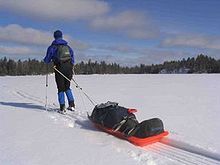| The topic of this article may not meet Misplaced Pages's general notability guideline. Please help to demonstrate the notability of the topic by citing reliable secondary sources that are independent of the topic and provide significant coverage of it beyond a mere trivial mention. If notability cannot be shown, the article is likely to be merged, redirected, or deleted. Find sources: "Pulk" – news · newspapers · books · scholar · JSTOR (June 2021) (Learn how and when to remove this message) |


A pulk (from Sami languages: puhlke, via Finnish: pulkka; Swedish: pulka; Norwegian: pulk; Northern Sami: bulki) is a Nordic short, low-slung small sled used in sport or for transport, pulled by a dog or a skier, or in Sápmi pulled by reindeer. They are classically made out of wood and other natural materials but are nowadays made of plastic, which makes them inexpensive.
Pulks are originally meant to carry supplies such as a tent or food, or transport a child or other person. In Norway and Sweden, pulks are often used by parents to pull small children on skiing trips. In Finland and Sweden, pulks exist as a winter toy, mainly for children, for going downhill. Besides the classic toy pulk there are similar alternatives like "saucers" (pulks shaped like a disc), as well as sleighs of different configurations.
A larger pulk, designed for transporting larger amounts of goods, is called ahkio in Finnish. This word is also used by the US Army for a human-drawn snow sled.
See also
References
- The Sámi and their reindeer – University of Texas at Austin
External links
- ACAPULKA international pulk/pulka website
- The Gear Junkie Archived 2007-09-26 at the Wayback Machine, a syndicated U.S. newspaper columnist, has an in-depth review of a pulk
- XC Ski World reviews of XC ski sleds
- Ski Randonne Nordique A French pulk website (in French)
- Laughing Daw blog Building a Backcountry Pulk
- Madriver Rocket Instructions to build a pulk